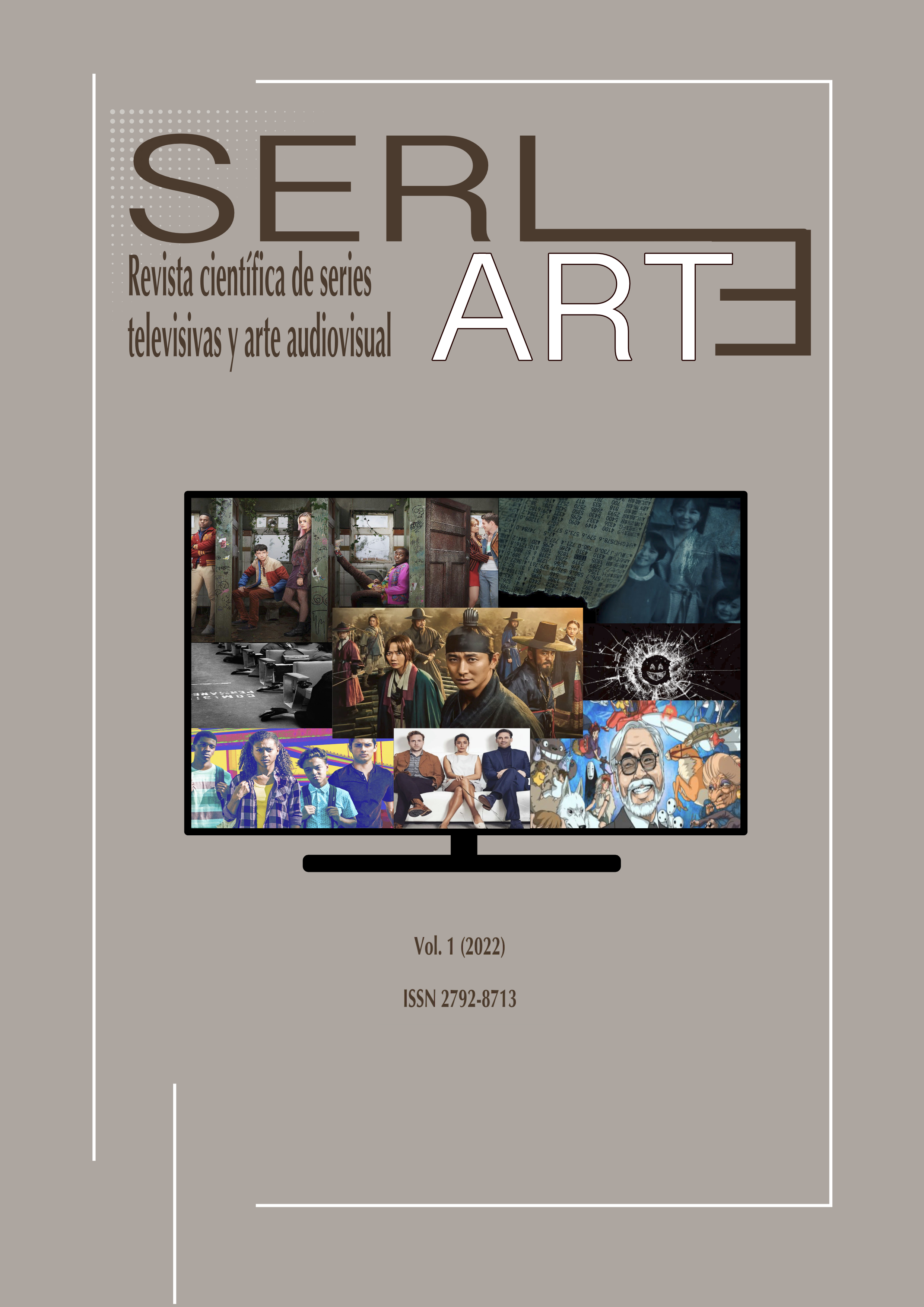Kingdom y el auge del zombi en la ficción televisiva surcoreana
Contenido principal del artículo
Resumen
La proliferación de las plataformas de vídeo bajo demanda y la globalización del terror televisivo en los últimos años ha hecho que monstruos representativos de la cultura popular occidental comiencen a aparecer en contextos nacionales en los que no suele ser habitual encontrarlos. Partiendo de esta premisa, este artículo se centra en el estudio de aquellos factores culturales, sociales y económicos que han contribuido a la popularización de las narrativas de zombis en Corea del Sur. Así mismo, analizaremos la serie Kingdom (Netflix: 2019-) con el objetivo de desentrañar las novedades narrativas que pudiera incorporar con respecto a las ficciones occidentales dedicadas a esta criatura, prestando especial atención a la forma en la que la naturaleza metafórica del muerto viviente se reformula adaptándola a las ansiedades culturales de la sociedad surcoreana.
Descargas
Datos de publicación
Perfil evaluadores/as N/D
Declaraciones de autoría
Indexado en
- Sociedad académica
- Seriarte. Revista científica de series televisivas y arte audiovisual
- Editorial
- Ucopress. Cordoba University Press
Detalles del artículo
Citas
ABBOTT, Stacey (2016), Undead Apocalyse: Vampires and Zombies in the 21st Century, Edimburgo: Edinburgh University Press.
ABBOTT, Stacey, y JOWETT, Lorna (2021), “It's Taking Over the Whole World. Global TV Horror, Then and Now”, en ABBOTT, Stacey, y JOWETT, Lorna (eds.), Global TV Horror, Cardiff: University Of Wales Press, pp.1-14.
BLAKE, Linnie (2015), “Are We Worth Saving? You Tell Me: Neoliberalism, Zombies and the Failure of Free Trade”, Gothic Studies, vol.17, n.º 2, pp.26-41. DOI: https://doi.org/10.7227/GS.17.2.3
BYUNG-YEUL, Baek (2019), “Netflix to invest more in Korean content”. En: <https://www.koreatimes.co.kr/www/tech/2021/08/133_262635.html>. (fecha de consulta: 21-06-2021).
CLARK, Travis, y RODRÍGUEZ, Ashley (2021), “El efecto Netflix en la TV mundial: 8 productores internacionales hablan del cambio de prioridades, el aumento de los presupuestos y la guerra de talento ante la creciente competencia del streaming”. En: <https://www.businessinsider.es/como-cambian-prioridades-televisivas-globales-netflix-nueva-competencia-892413>. (fecha de consulta: 06-08-2021).
DEGOUL, Franck (2011), “We are the mirror of your fears: Haitian Identity and Zombification”, en CHRISTIE, Deborah, y LAURO, Sarah Juliet (eds.), Better Off Dead: The Evolution of the Zombie as Post-Human, New York: Fordham University Press, pp.24-38.
DOHERTY, Thomas Patrick (1999), Pre-Code Hollywood: Sex, Immorality, and Insurrection in American Cinema, 1930-1934. New York: Columbia University Press.
DUEÑAS MOHEDAS, Sonia (2020), “Entre el cine independiente y el blockbuster en Corea del Sur: Las obras de Yeon Sang-Ho y su recepción en España”, L'Atalante: revista de estudios cinematográficos, n.º 29, pp.53-66.
GONZAGA, Elmo (2021), “Zombie capitalism and coronavirus time”, Cultural Studies, vol.35, nº. 2-3, pp.444-451. DOI: https://doi.org/10.1080/09502386.2021.1898022
HWANG, Yun Mi (2011), South Korean Historical Drama: Gender, Nation and the Heritage Industry, Tesis Doctoral, University of St. Andrews, Saint Andrews.
JAECHEOL, Kim (2019), “Biocalyptic imaginations in Japanese and Korean films: undead nation-states in I Am a Hero and Train to Busan”, Inter-Asia Cultural Studies, vol.20, nº. 3, pp.437-451. DOI: https://doi.org/10.1080/14649373.2019.1649015
JUN-SUK, Yeo (2019), “Netflix attributes popularity of ‘Kingdom’ to technological innovation”. En: <https://www.koreaherald.com/view.php?ud=20190206000121>. (fecha de consulta: 15-06-2021).
KEELEY, Pete (2020), “Writer, Director of South Korean Zombie Drama ‘Kingdom’ on Global Response and Coronavirus Parallels”. En: <https://www.hollywoodreporter.com/tv/tv-news/netflixs-kingdom-creators-talk-releasing-zombie-drama-coronavirus-1290604/>. (fecha de consulta: 10-07-2021).
LEE, Sung-Ae (2019), “The New Zombie Apocalypse and Social Crisis in South Korean Cinema”, Coolabah, n.º 27, pp.150-166.
LOTZ, Amanda (2020), “In between the global and the local: Mapping the geographies of Netflix as a multinational service”, International Journal of Cultural Studies, vol.24, nº. 2, marzo, pp.195-215. DOI: https://doi.org/10.1177/1367877920953166
MACDONALD, Joan (2020), “Writer Kim Eun-hee Shares Her Inspiration For The Historical Zombie Drama ‘Kingdom’”. En: <https://www.forbes.com/sites/joanmacdonald/2020/03/12/writer-kim-eun-hee-shares-her-inspiration-for-the-historical-zombie-drama-kingdom>. (fecha de consulta: 16-07-2021).
MIN-YEONG, Kim (2019), “A study on the expansion of platform and the aspect of zombie narrative ― Mainly on the basis of NETFLIX original drama season 1”, The Journal of Modern Literary Theory, vol.77, pp.61-85. DOI: https://doi.org/10.22273/SMLT.77.3
MORELAND, Sean (2011), “Shambling Towards Mount Improbable to Be Born: American Evolutionary Anxiety and the Hopeful Monsters of Matheson's I Am Legend and Romero's Dead Films”, en BOLUK, Stephanie, y LENZ, Wylie (eds.), Generation Zombie: Essays on the Living Dead in Modern Culture, Jefferson: McFarland & Co Inc, pp.77-89.
NEIRA, Elena (2020), Streaming Wars: La nueva televisión, Barcelona: Planeta.
NEIRA, Elena (2021), “Quién es quién en la guerra del 'streaming': Netflix, la que inventó el modelo que ahora todos copian”. En <https://www.businessinsider.es/netflix-invento-modelo-ahora-todos-copian-905723>. (fecha de consulta: 06-08-2021).
OH, Eunha (2012), Monster Mothers and the Confucian Ideal: Korean Horror Cinema in the Park Chung Hee Era, Tesis Doctoral, University of Texas, Austin.
PEIRSE, Alison, y MARTIN, Daniel (2013), “Introduction”, en PEIRSE, Alison, y MARTIN, Daniel (eds.), Korean Horror Cinema, Edimburgo: Edinburgh University Press, pp.1-20.
PHILLIPS, Kendal R. (2005), Projected Fears: Horror Films and American Culture, Westport: Praeger Publishers.
PINEDO, Isabel (2004), “Postmodern Elements of the Contemporary Horror Film”, en PRINCE, Stephen (ed.), The Horror Film, New Jersey: Rutgers University Press, pp.85-117.
RUSSELL, Jaime (2006). Book of the Dead: The Complete History of Zombie Cinema, Godalming: FAB Press.
SHAVIRO, Steven (1993), The Cinematic Body, Minnesota: University of Minnesota Press.
SONG, Sooho (2020), “The Evolution of the Korean Wave: How Is the Third Generation Different from Previous Ones?”, Korea Observer, vol.51, n.º 1, pp.125-150. DOI: https://doi.org/10.29152/KOIKS.2020.51.1.125
TOTARO, Donato (2003), “The Italian zombie film: From derivation to invention”, en SCHNEIDER, Steven Jay (ed.), Fear without Frontiers: Horror Cinema Across the Globe, Godalming; FAB Press, pp.161-174.
TU, Wei-Ming (1998), “Confucius and Confucianism”, en SLOTE, Walter H., y DE VOS, George A. (eds.), Confucianism and the Family, Albany: State University of New York Press, pp.3-36.
WAGNER, Keith B. (2016), “Endorsing upper-class refinement or critiquing extravagance and debt? The rise of neoliberal genre modification in contemporary South Korean cinema”, Critical Arts, vol.30, n.º 1, pp. 117-138. DOI: https://doi.org/10.1080/02560046.2016.1164389
WAGNER, Keith B. (2019), “Train to Busan (2016): Glocalization, Korean Zombies, and a Man-Made Neoliberal Disaster”, en LEE, Sangjoon (ed.), Rediscovering Korean Cinema, Ann Arbor: University of Michigan Press, pp.515-532.
WEPRIN, Alex (2021), “Netflix Adds 1.5 Million Total Subscribers, But Loses Ground in U.S./Canada” En: <https://www.hollywoodreporter.com/business/digital/netflix-q2-2021-earnings-1234985080/>. (fecha de consulta: 06-08-2021).






